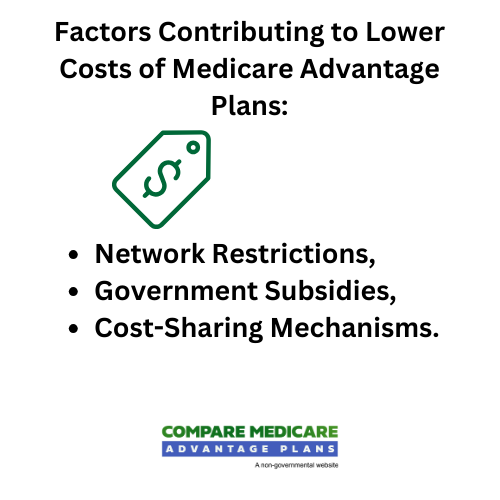Why Are Medicare Advantage Plans Cheaper Than Medigap?
Navigating the potential Medicare Advantage Plans may be complex, but understanding the differences between Medicare Advantage and Medigap plans could be essential for making the right choice for your healthcare coverage.
You may want to be aware of the potential factors that could contribute to making certain Medicare Advantage plans cheaper than Medigap.
In addition, your personal health status and financial situation could influence your decision. This article will explore these questions and more to help you make an informed decision when choosing between Medicare Advantage and Medigap plans.
Key Takeaways
- Comparing the potential benefits and coverage between Medicare Advantage and Medigap plans may be essential for determining which plan best meets individual healthcare needs.
- Medicare Advantage will likely offer lower premiums, less network restrictions, government subsidies, cost-sharing mechanisms & additional services. While Medigap could provide more flexibility & choice in providers with potential consumer protections.
- Personal factors such as health status & financial situation should be carefully considered when selecting a Medicare plan to determine the most suitable option.
Compare Plans in One Step!
Enter Zip Code
Understanding Medicare Advantage and Medigap
Medicare Advantage and Medigap could serve as alternatives to traditional Medicare, offered by private insurers as Medicare supplement insurance.
Both plans are available to individuals with certain disabilities or who have reached the age of 65, and may include prescription drug coverage. However, it is not possible to possess both a Medicare Advantage and a Medigap plan concurrently, as some Medicare Advantage plans may also include prescription drug coverage and Medigap plans do not.

One of the main differences between Medicare Advantage and Medigap will likely lie in the flexibility of healthcare provider choices. Medigap policyholders may be obligated to be enrolled in Original Medicare, which includes hospital insurance (Part A) and medical insurance (Part B) and may visit any healthcare provider that accepts Medicare.
On the other hand, Medicare Advantage beneficiaries could be required to see providers within their plan’s network. This variation in provider choice and coverage options should be considered when deciding between Medicare Advantage and Medigap.
What Is Medicare Advantage?
Medicare Advantage plans are private insurance alternatives to Original Medicare, which could provide coverage for the same services but may also include additional benefits.
These plans will likely be available to individuals who are enrolled in Medicare Part A and Part B and reside in the plan’s service area. Medicare Advantage plans could potentially provide lower premiums at the cost of certain network restrictions, possibly implying that beneficiaries must use in-network healthcare providers to enjoy full coverage and reduced costs.

Some of the potential benefits of Medicare Advantage could be its potential provision of extra services beyond what Original Medicare offers, such as prescription drug coverage and coverage for vision, hearing, and dental care.
Some of these extra benefits might make Medicare Advantage plans more attractive to individuals who are in good health with few medical expenses, as they could provide more comprehensive coverage at a lower cost than traditional Medicare alone.
What Is Medigap?
Medigap, also known as Medicare supplement insurance, is a type of insurance policy that has been designed to cover the gaps in Original Medicare coverage. Medigap plans are sold by private insurance companies and may help cover certain out-of-pocket expenses such as deductibles, copayments, and coinsurance that may not be covered by Medicare.
While some Medigap plans may have higher premiums than Medicare Advantage plans, they could offer more flexibility and choice in healthcare providers, possibly making them a better option for individuals who prioritize provider options.
When deciding on your healthcare coverage, considering the potential costs and benefits of both Medicare Advantage and Medigap plans is necessary.
Possible Factors Contributing to Lower Costs of Medicare Advantage Plans

Several factors could contribute to the lower costs of Medicare Advantage plans compared to Medigap, which may include network restrictions, government subsidies, and cost-sharing mechanisms.
Understanding these potential factors could help you make a more informed decision when choosing between Medicare Advantage and Medigap plans.
Limiting the number of healthcare providers and facilities in the plan’s network through potential network restrictions in certain Medicare Advantage plans could aid in cost control.
This will likely enable insurance companies to negotiate lower rates with the providers, which could potentially reduce the costs of the plan.
Additionally, certain network restrictions may also help limit the use of healthcare services, which could prevent any unnecessary or overuse of medical resources, which may in turn lead to cost savings.
Potential Network Restrictions
Some Medicare Advantage plans may have network restrictions that could aid in cost control by constraining provider choices. Some restrictions may involve:
- Constructing narrow networks of healthcare providers
- Negotiating lower rates with those providers
- Directing patients toward more cost-effective providers
- Reducing superfluous utilization of healthcare services
These measures could help to control healthcare costs and possibly allow resources to be employed efficiently.
To become informed of the potential network restrictions in Medicare Advantage plans, you could:
- Familiarize yourself with the network
- Verify network coverage
- Obtain referrals if necessary
- Utilize the plan’s resources
- Comprehend out-of-network costs
Understanding the potential network restrictions of a Medicare Advantage plan could help you decide whether this type of plan is the right fit for your healthcare needs.
Government Subsidies
Government subsidies for certain Medicare Advantage plans will likely operate by providing a set rate per person. This rate will likely be paid by the government to the Medicare Advantage plans to assist in covering some of the expenses of providing healthcare services to beneficiaries.
Furthermore, beneficiaries with low incomes and modest assets may be eligible for assistance with Part D plan premiums and cost-sharing through the Part D Low-Income Subsidy program.
These government subsidies could help lower the cost of Medicare Advantage plans in several ways. To begin, the government pays Medicare Advantage plans a fixed rate per individual, per year, which may serve to reduce the overall cost of the plans.
Additionally, plans with bids that fall below the benchmark may receive a part of the difference as a rebate, which must be utilized to subsidize premiums and lower costs for enrollees. These subsidies could make Medicare Advantage plans more accessible to beneficiaries.
Cost-Sharing Mechanisms
Some Medicare Advantage plans may utilize cost-sharing mechanisms including deductibles, copayments, and coinsurance. These mechanisms could facilitate the sharing of the cost of healthcare services between the plan and the beneficiary, potentially leading to a decrease in premiums and savings for the health insurance company.
Moreover, some cost-sharing mechanisms may enable health plans to submit bids above the lowest possible costs, which may further decrease costs for Medicare Advantage plans.
Reviewing the specific cost-sharing mechanisms of a Medicare Advantage plan will likely be necessary to understand how these mechanisms might affect your out-of-pocket expenses.
For example, copayments are a fixed amount you will need to pay for each medical service or item, while deductibles represent the amount you must pay before the plan begins to cover your medical expenses. By understanding these cost-sharing mechanisms, you could better anticipate your out-of-pocket expenses and choose a plan that aligns with your financial situation.
Comparing Potential Benefits and Coverage
Comparing the possible benefits and coverage between Medicare Advantage and Medigap may be necessary to determine the best plan for your individual needs. Both plans could offer different coverage options and benefits, so it is important to weigh the potential advantages and disadvantages of each plan before making a decision.
By understanding the benefits and coverage that may be offered by Medicare Advantage and Medigap plans, you can make an informed decision about which plan is best suited for your healthcare needs.

Some Medicare Advantage plans may offer additional benefits not included in regular Medicare, such as:
- Hearing aids
- Vision care
- Dental care
On the other hand, certain Medigap plans may provide nontraditional benefits, such as vision, dental, and hearing services, that may not be provided by Medicare Advantage.
Additional Services Offered by Medicare Advantage
Another potential benefit of certain Medicare Advantage plans could be the provision of extra services beyond what Original Medicare offers, such as prescription drug coverage and coverage for vision, hearing, and dental care.
These additional benefits could make Medicare Advantage plans more attractive to individuals who are in good health with few medical expenses, as they could potentially provide more comprehensive coverage at a lower cost than traditional Medicare alone.
Flexibility and Choice with Medigap
Compared to Medicare Advantage plans, some Medigap plans may provide more flexibility and choice in healthcare providers.
With Medigap, you will likely have the liberty to select any healthcare provider that accepts Medicare, which could provide a broader range of options in comparison to Medicare Advantage plans, such as a network of preferred providers.
This flexibility in provider choice could be particularly advantageous for individuals who prioritize their ability to choose their healthcare providers or who require more comprehensive coverage and have higher healthcare needs.
Additionally, some states may offer additional consumer protections and benefits that could go beyond the minimum federal standards, possibly enhancing the appeal of Medigap plans for those seeking greater flexibility and choice in their healthcare coverage.
Assessing Out-of-Pocket Expenses
When comparing Medicare Advantage and Medigap plans, out-of-pocket expenses should be considered, as they could considerably influence the total cost of your healthcare coverage.
While some Medicare Advantage plans may have lower premiums, they may also involve higher out-of-pocket costs, such as deductibles, copayments, and coinsurance for covered services. Conversely, Medigap plans will likely have higher premiums but offer more comprehensive coverage, possibly helping to reduce out-of-pocket expenses.
By assessing the potential out-of-pocket expenses associated with both Medicare Advantage and Medigap plans, you could gain a better understanding of the true cost of each plan and make a more informed decision about which plan is best for your healthcare needs and financial situation.
It is essential to carefully review the plan documents and compare different options to acquire a better understanding of the potential out-of-pocket expenses for both Medicare Advantage and Medigap plans.
Medicare Advantage Out-of-Pocket Limits
Some of the Medicare Advantage plans may impose out-of-pocket maximums, which coudl be advantageous for certain plan holders.
These potential limits could help protect beneficiaries from high healthcare costs by capping the amount they may be required to pay for covered services each year. The out-of-pocket limits for Medicare Advantage Plans may differ by state.

Understanding the possible out-of-pocket limits of your Medicare Advantage plan will likely be important for predicting your potential healthcare expenses and ensuring that you choose a plan that suits your financial situation.
Medigap’s Comprehensive Coverage
Medigap’s comprehensive coverage may result in lower out-of-pocket expenses for beneficiaries, despite potentially higher monthly premiums. Some Medigap plans may also supply additional coverage to supplement Medicare, which could potentially reduce the amount beneficiaries must pay for services not covered by Medicare.
The comprehensive coverage of Medigap plans includes coverage for Medicare Part A and Part B, as well as other medically necessary services as determined by Medicare. This coverage could help bridge the “gaps” in Original Medicare coverage, possibly reducing the financial burden on individuals and providing additional financial protection for those with higher medical needs.
Understanding the comprehensive coverage that could be offered by Medigap plans can help you decide whether this type of plan is the right fit for your healthcare needs and financial situation.
Other Factors to Consider
When deciding between Medicare Advantage and Medigap plans, considering personal factors such as health status and financial situation will likely be important.
Your individual healthcare needs and financial priorities could significantly impact the overall cost and benefits of each plan, making it essential to weigh these factors when making a decision.
For instance, individuals in good health with few medical expenses may find many Medicare Advantage plans to be a cost-effective option, given they provide more comprehensive coverage at a lower cost than traditional Medicare alone.

On the other hand, those with extensive medical needs or who prefer more freedom in selecting healthcare providers might find Medigap plans to be a better fit. By considering these personal factors, you can make a more informed decision about which type of Medicare coverage is most suitable for your individual needs.
Health Status and Medical Needs
Your health status and medical needs could significantly influence the best plan for your healthcare coverage.
Some Medicare Advantage plans may be more suitable for individuals who are in good health with few medical expenses as they could offer additional benefits beyond what Original Medicare offers, such as:
- preventive care
- prescription drug coverage
Furthermore, some Medicare Advantage plans may also be more cost-effective for individuals who do not require frequent healthcare services.
On the other hand, certain Medigap plans may be more suitable for individuals with more serious health conditions, as they could help cover expenses not fully covered by Medicare, such as deductibles, copayments, and coinsurance.
Some Medigap policies may also offer additional financial protection for those with higher medical needs, possibly making them a better choice for individuals who require more comprehensive coverage and have higher healthcare needs.
Budget and Financial Situation
Your budget and financial situation should also be taken into account when deciding between Medicare Advantage and Medigap plans.
Some Medicare Advantage plans may have reduced monthly premiums and may offer additional benefits, making them more cost-effective for those with limited financial resources.
Conversely, Medigap plans may have higher premiums but offer more comprehensive coverage, which could be advantageous for those who can pay higher upfront costs and prefer more freedom in selecting healthcare providers.
In the end, your decision between Medicare Advantage and Medigap plans will likely depend on your financial priorities and healthcare needs. By considering your budget and financial situation, you could make a more informed decision about which type of Medicare coverage is most suitable for your individual needs.
Summary
Understanding the differences between Medicare Advantage and Medigap plans could be essential for making an informed decision about your healthcare coverage.
By considering potential factors such as network restrictions, government subsidies, and cost-sharing mechanisms, as well as your personal health status, medical needs, and financial situation, you can determine which plan is the best fit for your individual needs.
Navigating the potential Medicare Advantage Plans could be complex, but with this information, you will likely be better equipped to make a well-informed decision about your healthcare coverage. Whether you choose a Medicare Advantage or Medigap plan, remember that the best plan for you is the one that meets both your healthcare needs and financial situation.
Frequently Asked Questions
→ Why do people choose Medigap over Medicare Advantage?
People might choose Medigap over Medicare Advantage because it may provide additional coverage for out-of-pocket expenses that Original Medicare doesn’t pay, while also giving the freedom to see any doctor who accepts Medicare.
Some Medigap plans may not cover prescription drugs, however, so an additional Part D policy may be required for prescription drug coverage.
→ What is the biggest advantage of Medicare Advantage?
Some Medicare Advantage plans may have flexible provider networks, several coverage options, and reduced out-of-pocket costs compared to original Medicare, possibly making them a more desirable option for those seeking comprehensive coverage.
→ Why are people choosing Medicare Advantage plans?
A lack of prior authorization and quick payments might have caused people to choose Medicare Advantage plans.
→ Why do doctors not like Medicare Advantage plans?
Doctors may not like Medicare Advantage plans because of the often stringent referral and pre-authorization requirements, which could get in the way of a patient’s necessary medical care.
→ What is the main difference between Medicare Advantage and Medigap plans?
The main difference between Medicare Advantage and Medigap plans is that the former may have network restrictions and may provide additional benefits, while the latter could offer more flexibility in healthcare provider choices and cover gaps in Original Medicare coverage.

ZRN Health & Financial Services, LLC, a Texas limited liability company



